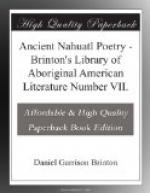TOCHIN, 89. From tochtli, rabbit; name of the brother of the Tezcucan ruler Quinantzin, and of many other personages.
TOLLAN, or TULAN, 46, 105, 107. The ancient mythical capital of the Toltecs. The common derivation from tolin, a rush, is erroneous. The name is a syncopated form of tonatlan, “the place of the sun.”
TOLTEC, properly TOLTECATL, 46, 111. An inhabitant of Tollan. The Toltecs were a mythical people, whose civilization was supposed to have preceded that of the Aztecs.
TOPILTZIN, 46, 105. “Our son” or “Our lord” (see Nopiltzin). The term was especially applied to Quetzalcoatl, q. v. See Orozco y Berra, Hist. Antig. de Mexico, Tom. III, p. 54.
TOTOQUILHUATLI, 41. From totoquilia, to act as agent or lieutenant. Ruler of Tlacopan. The verse of the song in which this name occurs is given in the original Nahuatl by Ixtlilxochitl, who says it was very popular throughout New Spain. See his Historia Chichimeca, cap. 32.
XICALANCO, 107. A locality on the borders of the province Tabasco. The people spoke Nahuatl. Deriv. xicalli, gourd or jar, and postpos. co.
XICOMATZINTLAMATA, 43. Name of a warrior not otherwise known. The compound seems to mean “skillful with angry hand” (xicoa, maitl, tlamati).
XICONTECATL, 103. Name of several distinguished Tlascalan warriors, lords of Tizatlan. See Clavigero, Hist. Antica di Messico, Tom. III, pp. 38 and 40, One was a favorite of Nezahualcoyotl. See Ixtlilxochitl, Historia Chichimeca, cap. 40.
XIUHTEUCTLI, 15. The god of fire, literally, “the lord of the year,” or “of the foliage.”
XIUHTZAL, 46. A queen of ancient Tollan, said by Clavigero to have ruled from A. D. 979 to 984. Other writers give the name more correctly Xiuhtlaltzin, “Lady of the Green Fields,” and place her death in 987. (Orozco y Berra, Hist. Antig. de Mexico, Tom. III, p. 45.)
XOLOTL, 46. An early if not the first king of the Chichimecs. His death occurred in 1232.
YOHUALLATONOC, 89. “Shining at night.” Name of a warrior.
YOPICO, 22. A division of the ancient city of Mexico, containing a temple of this name. The word means “the place of the tearing out of hearts” (yolltol, pi, co), from the form of sacrifice there carried out.
YOYONTZIN, 35, 40, 66, 67. A name of Nezahualcoyotl. See p. 35.
FOOTNOTES.
[Footnote 1: Diego Duran, Historia de las Indias de Nueva Espana, Tom. I, p. 233; and compare Geronimo de Mendieta, Historia Eclesiastica Indiana, Lib. II, cap. 31.]
[Footnote 2: Sahagun, Historia de Nueva Espana, Lib. VIII, cap. 26.]
[Footnote 3: Sahagun, Historia de Nueva Espana, Lib. III, cap. 8.]
[Footnote 4: Cuicoyan, from cuica, song, and the place-ending yan, which is added to the impersonal form of the verb, in this instance, cuicoa. Mr. Bancroft entirely misapprehends Tezozomoc’s words about these establishments, and gives an erroneous rendering of the term. See his Native Races of the Pacific Coast, Vol. II, p. 290, and Tezozomoc, Cronica Mexicana, cap. 18.]




